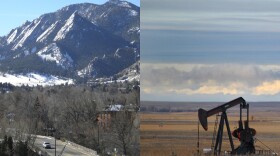ThereŌĆÖs good news for ColoradoŌĆÖs economy going into 2014, the latest economic forecast is projecting solid growth. The stateŌĆÖs employment rate also continues to grow faster than the nationŌĆÖs.
ŌĆ£The economy is becoming a little more boring, but donŌĆÖt take that the wrong way,ŌĆØ said Jason Schrock, an economist with the GovernorŌĆÖs Office of State Planning and Budgeting. ŌĆ£Saying the economy is more boring is a good thing. We all know what itŌĆÖs like to live in interesting times.ŌĆØ
His definition of boring came as he briefed lawmakers on the joint budget committee Friday. It really just means the economy is becoming ŌĆ£stable, more durable.ŌĆØ
Economists, like Larson Silbaugh with the non-partisan Legislative Council, also say the country is becoming immune to the ongoing financial debates in Congress like the recent .
ŌĆ£Businesses and households have been less responsive to the constant brinkmanship and fiscal deadlines,ŌĆØ said Silbaugh. ŌĆ£If the negotiations over the debt ceiling are tense and go down to the wire it wonŌĆÖt have much of an impact. If we breach the debt ceiling, that could have serious repercussions.ŌĆØ
Colorado is expected to add nearly 60,000 jobs next year. The quarterly revenue forecast says one reason ColoradoŌĆÖs economy is outperforming the countryŌĆÖs is because many of the stateŌĆÖs industries such as energy, bio-tech and agriculture are doing especially well.







